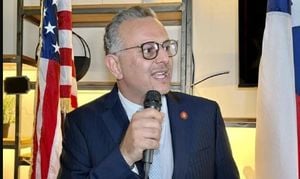Georgia is currently experiencing tumultuous protests, igniting tension across the nation as citizens grapple with the ruling government's decision to freeze its application for European Union (EU) membership. The roots of these protests run deep, propelled by political dissatisfaction and aspirations for closer ties with Europe.
For over four nights, thousands have rallied against the Georgian Dream party, which governs the country, culminating on December 2nd, when the situation escalated dramatically. Protesters clashed with police, who responded vigorously, firing tear gas and water cannons. Onlookers witnessed astonishing displays of resilience as citizens confronted law enforcement to direct their outrage about the suspension of EU talks.
The unrest stems from rising anxiety among Georgians about their government’s direction. Critics accuse the governing party of veering away from democratic principles and fostering closer ties with Russia, jeopardizing Georgia’s longstanding ambition for EU integration. The controversial decision to halt EU accession discussions following allegations of electoral fraud has only heightened the crisis.
Salome Zourabichvili, Georgia’s pro-European president, has publicly aligned herself with the protestors. She described the movement as "another powerful night of Georgians standing firm to defend their constitution and their European choice." This shows her opposition to the government’s maneuvers has become increasingly vocal, as she seeks to galvanize support against the purportedly rigged election results.
The backdrop of these protests paints a troubling picture: the Georgian Dream party's recent rhetoric suggests they perceive the EU’s involvement as meddling, framing the suspension of talks as necessary for national sovereignty. Prime Minister Irakli Kobakhidze encapsulated this sentiment by alleging the EU was attempting to “blackmail” Georgia.
Notably, Georgia's path to EU membership has been characterized by optimism and setbacks since its independence from the Soviet Union post-1991. Following years of strife and conflict, including the 2008 war with Russia, public sentiment has largely favored integration with Western structures. Polls have consistently shown support among Georgians for EU membership, but recent government actions threaten to misalign aspirations.
The protests have spread beyond the capital Tbilisi, with reports of demonstrations erupting across several cities and towns. Demonstrators have even blocked key routes, such as access roads leading to the Black Sea port, indicating widespread discontent. Such actions reflect the yearning for greater accountability and alignment with European standards.
Reports indicate significant injuries among police forces, along with numerous arrests during the clashes. Official statements provide chilling insights: the Georgian Ministry of Internal Affairs asserted 21 police officers had suffered injuries as law enforcement battled demonstrators. Spanning multiple cities, protesters voiced their anger over what they perceive as the government’s anti-Western drift.
To compound the instability, Zourabichvili's statements affirm her intention to remain president until the elections can be deemed free and fair. She insists the recently elected parliament lacks legitimacy, inferring the need for new elections. This declaration may suppress the ruling party's ambitions as they navigate the charged political climate.
Another layer of this political drama involves the government's previous attempts to implement controversial laws targeting civil society. Critics allege these laws serve to suppress dissent, thereby undermining Georgia's democratic architecture. The government had previously introduced legislation branding NGOs receiving substantial foreign funding as "foreign agents," leading to accusations of heightened authoritarianism.
The situation has drawn attention from international observers. The West remains deeply concerned about Georgia's veering course from democratic norms toward possible authoritarianism under the Georgian Dream. Recent expressions of unease have surfaced from the United States government, which has publicly condemned the ruling party’s apparent pivot away from Euro-Atlantic integration.
Georgia’s situation remains fluid, and the protests signal broader regional tensions, echoing sentiments prevalent across postsoviet states. The looming question is whether these protests can influence the government’s decisions and rekindle Georgia’s long-held aspirations for EU membership.
With the upcoming elections casting uncertainty over the political horizon, the road to stability may be fraught with challenges. The protests show no signs of abetting; citizens remain steadfast, demanding their government prioritize their aspirations over allegiance to Russian interests.
This desire for change, coupled with Zourabichvili's support, suggests the protests could morph from merely spontaneous actions to organized movements capable of altering the political fabric of Georgia. The nation stands at yet another crossroads, where the choice between East and West could define its future for generations.



